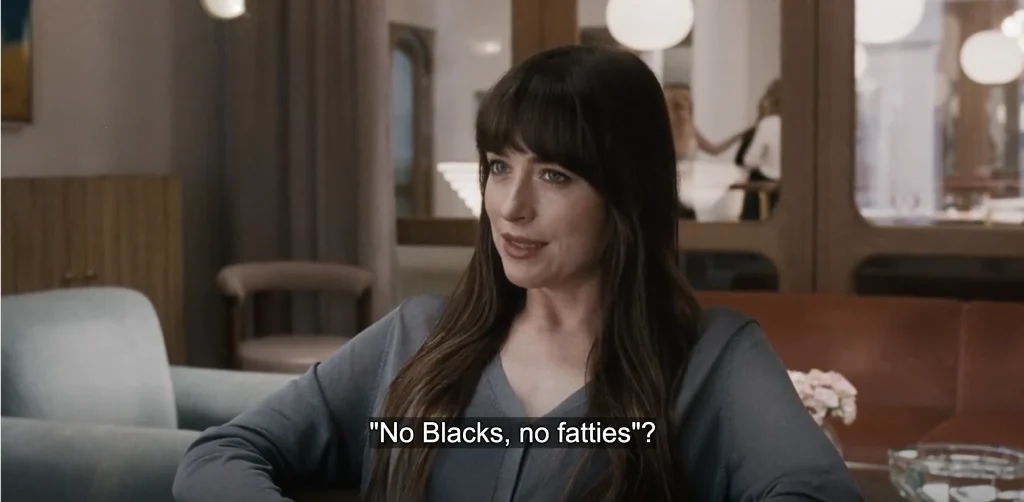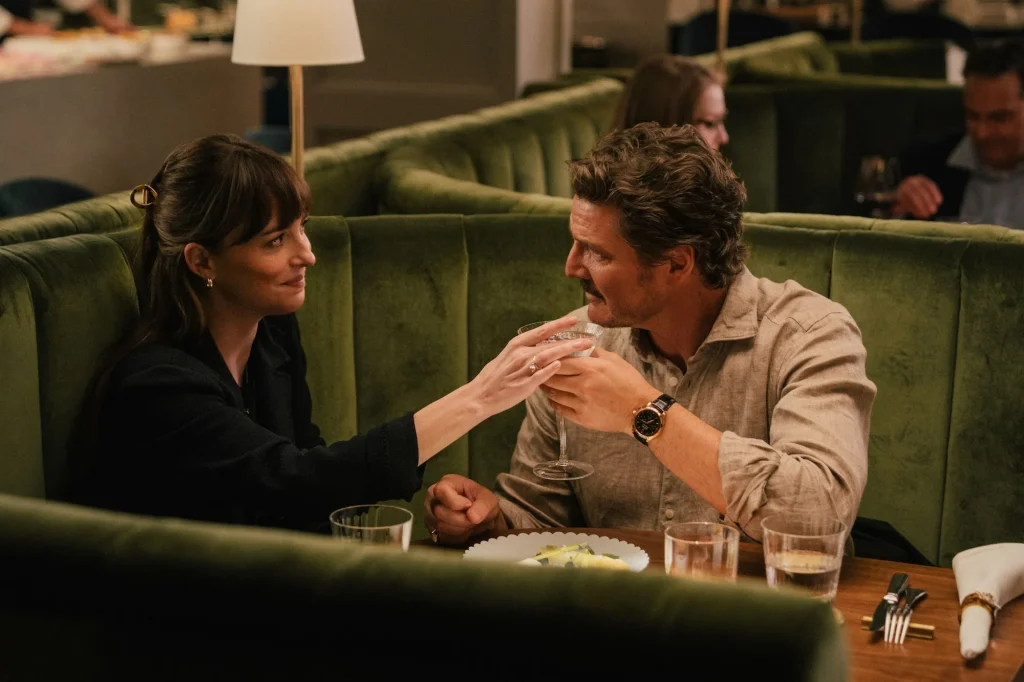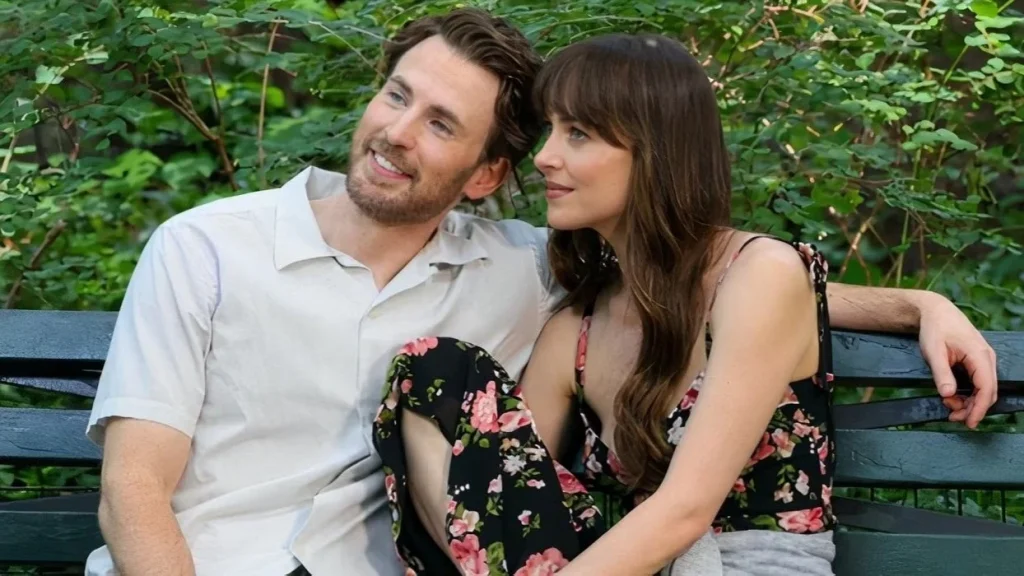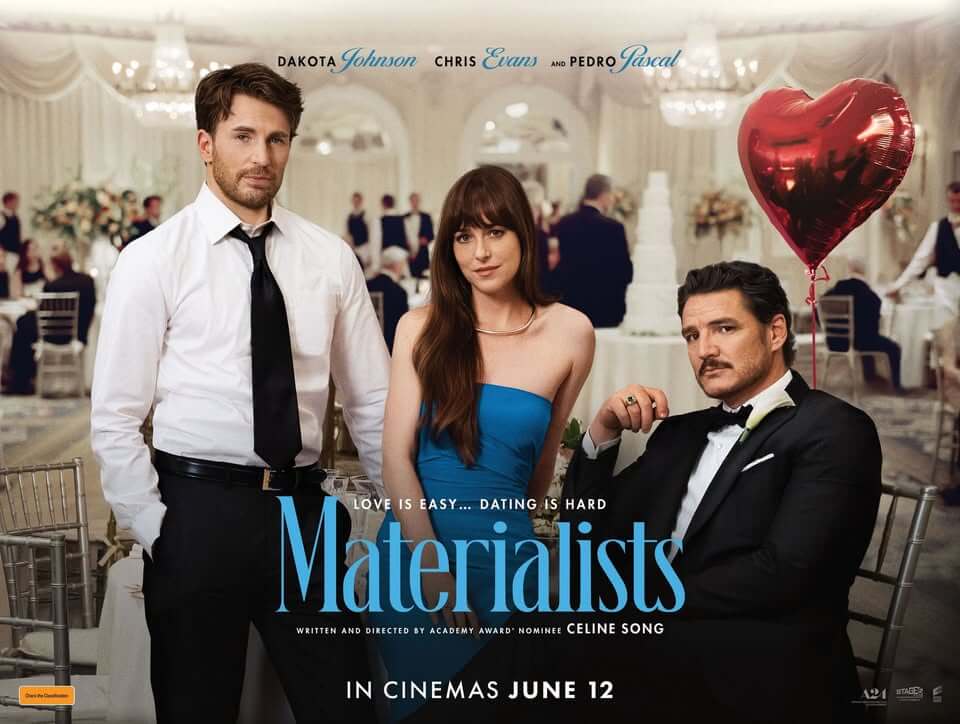“Materialists” Criticism of Capitalism and Merchandized Relationships
“Materialists” written and directed by Celine Song, follows Lucy (Dakota Johnson), a prestigious and successful New York matchmaker who prides herself on securing ideal pairings while avoiding commitment herself. Suddenly, her life is flipped over when she’s courted by Harry (Pedro Pascal), a wealthy, seemingly perfect financier, at the same time as she unexpectedly reconnects with her broke but caring ex, John (Chris Evans). As she navigates the tension between love and material security, Lucy realizes that Harry represents stability but not genuine passion. On the other hand, John, though financially unstable, offers emotional honesty and love. In the end, Lucy chooses John, and in a sweet moment in Central Park, he jokingly proposes with a flower ring, asking if she’d like to make “a very bad financial decision”. She accepts, and the film closes with them applying for a marriage license at City Hall, affirming that real love is bigger than perfect metrics.
The movie portrays what we all know and have experienced, the superficial dating experience. Between “situationships”, expecting perfect individuals, dating apps, people looking for a specific status, unattainable beauty standards, and plastic surgery, it’s like everyone is supposed to become either Barbie with her perfect Dreamhouse or a Ken with Max Steel’s abs and Jordan Belfort’s money before they start pursuing love.
Merchandized Love
The film’s criticism is clear on how love is no longer the main character in our lives, yet just another accessory. Even accessories carry more protagonism than love these days. In the scene where Lucy and Harry are talking about their body modifications, Harry admits to having surgery to increase his height, and Lucy admits to having breast augmentation and a nose modification. Harry talks about how he and his brother underwent the surgery, and their lives changed. They became the focus of social gatherings; their popularity increased, and people started noticing them. Women began engaging in conversations with them, corresponding to their approach and energy. Lucy then mentions modifications are a way of “investing in the body like an apartment”. Shortly after, Lucy admits she doesn’t have any feelings for Harry and that she doesn’t think she should travel to Iceland with him. Harry then says, “But, we’re the perfect match”.
Celine Song is clever and straightforward when it comes to portraying Lucy as a materialist. Lucy even admits it, but she slowly wants to distance herself from that. Harry saying they’re the perfect match is a way of showing how we want to perfect ourselves as the ideal machine for the obsessive, perfect life that fits like an unequivocally mathematically precise puzzle. In this sense, late-stage capitalism has driven us to measure success on quantity rather than quality, and that infiltrates our love lives too.
In our current times, we are pushed to overconsume in every sense, even non-material things like popularity, status, followers, and online content. We are expected to desire more of everything to fill an emptiness or a lack of happiness. We’re told that the more we consume, the more perfect we become and the more ideal our lives become. If our lives are perfect, then we are supposed to feel automatically complete. To be perfect, we are expected to become an exceptional personal brand, and to maintain it, we have to market ourselves in the same way that Lucy’s clients do. We then market ourselves as the best investment, just like Lucy’s analogy of the apartment. We want to prove ourselves to others and persuade them to invest in us because their return will be worth it. It doesn’t matter how ridiculous it looks in the movie; it represents reality exactly as it is. When Lucy talks to her clients, they are explicit with what they want: an “older woman, but not too old”. A “woman in her thirties, but not late thirties”. A “tall man, at least 6 feet”. A “rich man, millionaire if possible”. An “ambitious man, but not too greedy”. And the worst ones: “no blackies and no fatties”.

The movie neither ridicules nor satirizes reality; it portrays it exactly as it is. It is a raw and depressing representation of early 20th-century dating. Even though people are not open about their own racist, fatphobic, classist, elitist views, they still hold them. People will never admit to it or say it in public, but they will check the box on a dating app or on social media when targeting their future partners. These unattainable beauty and status standards are directly linked to capitalism, and it keeps getting worse. As personal brands, we are expected to have a social media presence and for others to consume our flawless content. We are expected to produce high-quality aesthetic content and share it multiple times a week. And it used to be purely social, hence the name “social media”. But that is no longer the case. As an actress, I know I am expected to market myself in a certain way to get better work opportunities or gigs. However, why is my chef friend or my bartender cousin also expected to have a considerable number of followers in order to grow professionally?
I have a friend who is an excellent chef. He has won awards and works at prestigious restaurants. Recently, he was offered a job with better pay, better benefits, and, of course, a more senior position. He’d be leading the team in this new job. However, he was asked for his social media account and the number of followers he has. What is the point of asking for a chef to be an influencer, too?
Well… you guessed it! The more popular the chef is, the more people the restaurant can attract. More sales, more money. This is a perfect example of how, these days, quantity is often prioritized over quality. No matter which profession. What happened to the excellence of the craft? What happened to escaping industrialized processes for a better, more detailed experience?
Dynamics based on popularity and perfection, rather than attention to detail, are plaguing our lives: our work lives, our family lives, and our love lives. We have been brainwashed into industrializing and marketing every single aspect of ourselves. This is why, eventually, Lucy starts to break down. She realizes she prioritized making herself the perfect machine for another ideal machine in a robotic relationship that nurtures no one. Unfortunately, love has often been associated with aesthetic values. What people on social media call “pretty privilege” is real. People treat you differently when you’re attractive. I once heard a man say, “If you’re a beautiful woman and you’re poor, you’re doing things wrong”. He then explained that beauty is yet another type of currency, especially for women. Women’s body is not only objectified but monetized too. We can analyze how misogyny is also linked to capitalism and even quote Celine Song in Refinery29, who gave the response to “Materialists” called “Broke Boy Propaganda”:
“I think there is a very real confusion about feminism and the history of feminism… because of intersectionality, so much of feminism has been anti-corporate and anti-capitalist, and of course, it was always at the forefront of fighting classism”.
Beauty has always been praised and prioritized. This critique of it in the movie reminds me of the dilemma in Federico Garcia Lorca’s “The Butterfly’s Spell”, in which Curianito, the cockroach, falls in love with the beautiful dying butterfly. Their love is impossible because they belong to two different worlds. One represents beauty, the ephemeral, the unknown, whilst the other represents the vulgar and the marginal.

The Need for Financial Security
Talking about money and Lucy being a materialist, and circling back to that “broke boy propaganda”, I only have one issue with the movie’s portrayal of seeking money. Whilst our current society is indeed money-driven, perhaps always has been, we also depend on money. What I mean is, we are in a desperate and constant search for money, material goods, and improving our position in society because we depend on it. We need it to survive, and of course, the extra is to satisfy our ego. But at the end of the day, we didn’t choose to be born in a capitalist world, and I empathize with Lucy’s desire to get out of poverty.
Lucy is materialistic. She desires more than what she needs, but in the scene of her anniversary to John, she loses her self-control and starts yelling about her need for financial stability, and I empathize with that. In that flashback, we see Lucy and John arguing in the middle of New York City traffic over their economic hardship. They can barely afford modest outings; they have a reservation at a restaurant, but if they arrive late or not at all, they will be charged $40. John is annoyed and surprised at that fee while Lucy is trying to convince him to park already, but parking is $20, which they can’t afford. John suggests having Halal Cart Food, but Lucy wants a special dinner for a special occasion. The tension grows until they both yell, and this leads to the end of their relationship.
In her argument, Lucy expressed her concern about a lack of financial stability. She mentions how difficult it was to grow up poor with a constant uncertainty about the future and being able to pay the bills. The flashback shows their relationship struggled because of the hardships that come with financial expectations in a relationship, but also the pressures of navigating finances as a team. Their relationship didn’t end due to a lack of connection or love, a dysfunctional dynamic, or a lack of commitment, but rather because of the circumstances. I would say their relationship was a victim of the system that gave them no choice.
John said, “I can’t afford to be with you”. That shows how he thinks Lucy is out of his league because she is very pretty and successful; therefore, she needs a richer man. The same mindset of “beauty is power” and therefore, beautiful women can get out of poverty. Without falling into that extreme, I think that a certain level of financial stability is necessary. Sometimes love is not enough. We need commitment, support, and love, but we also need to keep our own well-being. What if by being with someone, we sacrifice our financial security? While dating John, Lucy could’ve worked to improve their situation, too. We don’t know the entire economic situation they were in. Was John the only one paying the bills, or was it the two of them? In the end, it makes sense that they get back together, they grow, and accept that they love each other. If initially, money was an important factor that led them to their breakup, how will they now get financial stability and avoid stress over money? Especially if Lucy quits her job.

I understand why Lucy is demanding a certain level of financial commodity. They’re both getting older, so if they were to start a family, they would need economic security. They would need, at least, a constant income rather than occasional payments. As women, we still need to see our partners work for a healthy financial balance. We still live in countries in which women earn less than men. Not only that, but globally, fathers keep abandoning their children. So as a woman, it’s perfectly normal to observe your partner’s earning and spending habits before you choose to marry them or have children with them. Just look at the following statistics:
– According to the U.S. Census Bureau, 17.6 million children in the U.S. live without a biological, step, or adoptive father.
– According to INEGI, 9.3%, 4.18 million of fathers in Mexico abandoned their children and have no contact with them.
– In the United Kingdom, one in eight divorced or separated fathers has no contact with their children. Almost a million men in the UK have dependent children that doesn’t live with them, and around 130,000 have no contact with them.
– South Africa has one of the highest rates of absent fathers. Around 60% of children under 10 don’t live with their biological fathers.
I understand Lucy’s struggle to find financial stability, but also love. She probably became a matchmaker for money and to provide for herself; however, she got caught in hypergamy, too. That’s the thing about capitalism, it traps you and then pushes you to reproduce its ways. We can’t blame women for capitalism’s faults, trying to find a richer husband, for many women, is a way of adapting to a system that puts them at a disadvantage. This is also why Celine Song said for Refinery29 that Feminism is anti-capitalist. Lucy understood this and became cynical about it, perpetuating the idea that marriage solely exists to improve your position in society. Even when she told Harry, “Marriage is a business deal, and the father won’t even get a cow”.
But what is the point of marriage anyway? If we truly love someone, we don’t need to marry them. The opening scene portraying survival as a “business deal” makes perfect sense of the inevitable “contracts” we have with everyone. Sure, we might have business partners with whom we share very explicit contracts, but friendships or relationships are also a contract. Why are you my friend? Why am I your friend? Well… because we provide support for one another. It’s a win-win contract, even if it’s genuine love or care for one another. Centuries ago, marriage provided security, joining families into alliances. It helped people grow their goods and prepare for adversity. Marriage even joined nations and kingdoms. But again, why do we even get married nowadays? Politically, we still benefit from marriage. People get married for money, status, security (especially when it comes to having children), but they also have benefits like joining their taxes, the likelihood of better salaries increases, and the likelihood of getting fired from their job decreases. In a way, marriage was designed to work in favor of the individual rather than as a genuine pursuit for love. Are people selfish because they look for money, status, and benefits in marriage, or are they pushed into it by a system that designed it in that way? I’m not defending materialism, but I deeply believe that if you truly love someone, you don’t even need to get married.
References:
García S., A. (2025). Padres ausentes: 58 % de hombres tras el divorcio evita dar pensión alimentaria constante a sus hijos. Infobae. https://www.infobae.com/mexico/2025/06/15/padres-ausentes-58-de-hombres-tras-el-divorcio-evita-dar-pension-alimentaria-constante-a-sus-hijos/
National Fatherhood Initiative. (n.d.). Father absence statistics. https://www.fatherhood.org/father-absence-statistic#:~:text=By%20The%20Numbers,%2C%20D.C.:%20U.S.%20Census%20Bureau
New research pokes holes in the idea that men don’t look after their kids. (2017). The Conversation. https://theconversation.com/new-research-pokes-holes-in-the-idea-that-men-dont-look-after-their-kids-82457
One in eight separated fathers out of touch with children. (2017). Lawson West Solicitors. https://www.lawson-west.co.uk/knowledge/one-in-eight-separated-fathers-out-of-touch-with-children/#:~:text=A%20new%20study%20has%20shown…



